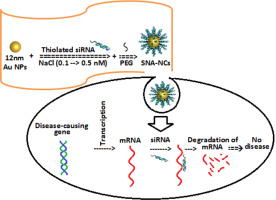Journal of Controlled Release ( IF 10.5 ) Pub Date : 2017-10-23 , DOI: 10.1016/j.jconrel.2017.10.034 Houshang Nemati , Mohammad-Hosein Ghahramani , Reza Faridi-Majidi , Babak Izadi , Gholamreza Bahrami , Seyed-Hamid Madani , Gholamreza Tavoosidana

|
Psoriasis is a T-cell-mediated skin disease with autoimmune nature that is generally not observed in animals, this lack of a relevant experimental animal model of psoriasis has hindered the investigation of pathogenesis of disease. Application and systemic delivery of small interfering RNAs offer many effective therapeutic advantages for gene regulation in the skin.
In this study, we present an IMQ animal model of psoriasis and designed a safe fusion peptide carrier, spherical nucleic acid gold nanoparticles conjugate, to improve penetration of the siRNA into the cells and skin and their targeting ability to gene regulation. We evaluated the model of psoriasis and EGFR siRNA treatment (as spherical nucleic acid nanoparticles), phenotypically (signs of erythema, scaling, inflammation and thickening), microscopic evaluation of cell proliferation and immunohistochemically evaluation of CD3, CD4, and CD8 markers. Also, we monitored suppression of EGF&EGFR genes after treatment of A431 cells by SNA-NCs. The expression of genes was validated by qRT–PCR in human skin cells.
The results showed that the SNA-NCs were stable and non-toxic. In vitro experiments indicated that EGF&EGFR siRNAs conjugated with spherical nucleic acid gold nanoparticles can significantly reduce gene expression in cells. In vivo experiments showed that the topical application of siRNAs delivered by SNA-NCs through the skin can significantly inhibit the proliferation of cells. Microscopic evaluation of mice back skin and immunohistochemistry process approved Inhibitory effect of SNA-NCs siRNA in the mouse model of psoriasis.
Since the proliferation of T cells was crucial for the development of a psoriatic phenotype. These results demonstrate that topical application of SNA-NCs siRNA may improve psoriatic-like skin lesions by suppressing gene expression and functional activity of T cell production.
中文翻译:

使用基于siRNA的球形核酸纳米颗粒偶联物进行牛皮癣的基因调控
牛皮癣是具有自身免疫性质的T细胞介导的皮肤疾病,通常在动物中未观察到,牛皮癣的相关实验动物模型的缺乏阻碍了疾病发病机理的研究。小干扰RNA的应用和系统递送为皮肤中的基因调节提供了许多有效的治疗优势。
在这项研究中,我们提出了一种牛皮癣的IMQ动物模型,并设计了一种安全的融合肽载体,球形核酸金纳米颗粒共轭物,以提高siRNA进入细胞和皮肤的渗透性以及它们对基因调控的靶向能力。我们评估了银屑病和EGFR siRNA治疗模型(作为球形核酸纳米颗粒),表型(红斑,鳞屑,炎症和增厚的迹象),细胞增殖的显微镜评估以及CD3,CD4和CD8标记的免疫组织化学评估。此外,我们监测了SNA-NC处理A431细胞后对EGF&EGFR基因的抑制作用。基因表达已通过qRT-PCR在人皮肤细胞中验证。
结果表明,SNA-NCs稳定且无毒。体外实验表明,与球形核酸金纳米颗粒缀合的EGF&EGFR siRNA可以显着降低细胞中的基因表达。体内实验表明,SNA-NC通过皮肤局部施用的siRNA可以显着抑制细胞的增殖。小鼠背部皮肤的显微镜评估和免疫组织化学过程证实了SNA-NCs siRNA在银屑病小鼠模型中具有抑制作用。
由于T细胞的增殖对于银屑病表型的发展至关重要。这些结果表明,局部应用SNA-NCs siRNA可以通过抑制T细胞生产的基因表达和功能活性来改善银屑病样皮肤损伤。











































 京公网安备 11010802027423号
京公网安备 11010802027423号